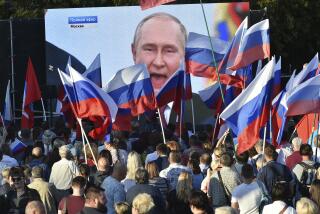Breaking into the ‘90s. A New World in Time. Walls fall, debts rise, politicians thrive, environments suffer-a look over the shoulder and over the horizon. : Europe Takes Center Stage as Soviet Empire Collapses
- Share via
SOUTH ROYALTON, VT. — Easily said, still hard to believe: The Soviet empire came to an end in 1989. History never came wrapped in a neater package.
In 1980, the will of the people found voice in the shipyards of Gdansk, Poland. Outlawed and driven underground, the movement only gathered strength. Last year, it stepped into the void left by the Polish Communist Party. Before year’s end, the power of this example swept four other Communist parties out of power, stranding Soviet armies in a Europe they could no longer hope to control.
All sorts of trouble may lie ahead but there is no going back. Three times in the course of their 40-year occupation, Soviet armies put down popular revolutions in Eastern Europe--in East Germany in 1953, in Hungary in 1956, in Czechoslovakia in 1968. Each episode sparked an international political crisis. An attempt to repeat suppression--simultaneously in five countries--would be indistinguishable from general war. As a result, several things end with the ‘80s: Moscow’s rule in Eastern Europe, communism as a political movement, the balance of power established after Germany’s defeat in 1945 and the fear of Soviet expansionism that sustained the Cold War.
It is so hard to exaggerate the political significance of these events. They place 1989 on a level with 1917, 1848 and 1789. But the full meaning of those years is in what followed, not in what ended; this will also be true now. As Niels Bohr used to say, “It is very hard to predict, especially about the future.”
Yet certain things seem likely. The first is Europe’s return to center stage in international politics. Not only the Soviet Union will recede to the wings, but the United States as well. We aren’t rich enough to pay for the reconstruction of Eastern Europe, and we are no longer irreplaceable in defense of the West. Europeans will be polite about it, but there will be some painful adjustments in Washington.
Second will be the re-emergence of a confident, powerful, united Germany. Poland, Hungary, Czechoslovakia, Romania and Bulgaria are now the orphans of Europe. No one is responsible for financing their recovery after 40 years of economic stagnation. They will have to beg for help where they can find it. Only East Germany will have a powerful patron.
The combination of a growing economy and return of the German capital to Berlin--what better concession can the West make to the pride of the East?--will make Germany first among equals in Europe. With luck, this will evolve slowly, but it is bound to happen. The peace of the world for the next generation depends on the grace and sure-footedness with which the rest of Europe allows it to unfold.
Yet one question looms largest: How will the Soviet Union respond to simultaneous losses of empire and political faith while the economy grinds ever deeper into paralysis? Will collapse of the Soviet empire be followed by collapse of the Russian empire--that vast stretch of Asian peoples, 11 time-zones wide, put together by czars in the 19th Century? At the moment, Mikhail S. Gorbachev himself seems to be the center of gravity holding the pieces together. The whole world--not just Russians--would do well to tell themselves: apr e s lui, le deluge .
More to Read
Sign up for Essential California
The most important California stories and recommendations in your inbox every morning.
You may occasionally receive promotional content from the Los Angeles Times.










